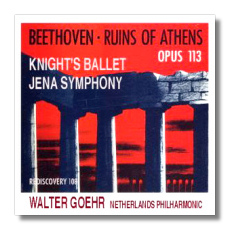
The Internet's Premier Classical Music Source
Related Links
-
Beethoven Reviews
Witt Reviews - Latest Reviews
- More Reviews
-
By Composer
-
Collections
DVD & Blu-ray
Books
Concert Reviews
Articles/Interviews
Software
Audio
Search Amazon
Recommended Links
Site News
 CD Review
CD Review
ReDiscoveries

- Ludwig van Beethoven:
- Incidental Music "The Ruins of Athens" *
- A Knight's Ballet
- Friedrich Witt: Symphony in C Major "Jena"
* Annie Woudt, soprano
* David Hollestelle, baritone
* Netherlands Philharmonic Choir
Netherlands Philharmonic Orchestra/Walter Goehr
ReDiscovery RD108 ADD monaural 73:38
Here's an interesting disc of Beethoven and almost-Beethoven in recordings once issued on LP by the mail-order Concert Hall label. From Beethoven's incidental music for The Ruins of Athens, most people know the Turkish March and possibly the overture. Athens has been overrun by the Turks, but Kotzebue's play reassures us that the arts still flourish in the city of Budapest. (It will come as no surprise that Kotzebue wrote this music for the National Theater in Budapest!) Here's the rest of the music, and it is much rarer on CD. There are several choruses, a duet for soprano and baritone, and a string of short arias. One might guess that this is early Beethoven, but it comes from 1811, and it's pretty good stuff, although one assumes that Beethoven could write music like this in his sleep. Goehr gives it his all, even if the Turkish March sounds more cute than threatening. (That's Beethoven's doing anyway, not Goehr's.) Particularly noteworthy is the full-voiced and attractive singing of baritone David Hollestelle, who sounds a bit like Hermann Prey.
A Knight's Ballet (or "Musik zu einer Ritterballet") is early Beethoven, composed in 1791, to be exact. Apparently with Beethoven's permission, his patron, the Count von Waldstein, took credit for writing it himself! (Perhaps Beethoven hoped that he could use the gift to his advantage later on.) It is even rarer on CD. After an introductory March, there is a German Song, a Hunting Song, a Romanze, a War Song, a Drinking Song, a German Dance, and a Coda. (So much for the life of a knight!) None of the eight sections is more than two minutes long. This music sounds not at all like Beethoven, so it is not surprising that this work's true authorship remained questionable for so long. Goehr ensures that the ballet's incipient pomposity never comes to the fore. This is not a particularly polished performance, but it is honest and jaunty.
Friedrich Witt's "Jena" Symphony probably would not have received the handful of recordings it has received over the years were it not for the mistaken belief for about five decades that it was a work by Beethoven. (The source of the confusion was a manuscript, found in 1909 in the city of Jena, with the attribution "Louis van Beethoven.") I am glad the truth came out, because while this is a perfectly acceptable Classical symphony, there's almost nothing about it – apart from the final movement, perhaps – that suggests the coming phenomenon known as Beethoven. Goehr's recording dates from the 1950s, when the symphony's true composer still was contested. Goehr treats it like a symphony by Beethoven, not like one by Franz Joseph Haydn, who also was proposed, at one time, as the composer of this work. (The Minuetto, marked "maestoso, "does sound particularly Haydnesque.) Here Goehr gets very good playing out of the Netherlands Philharmonic Orchestra, and the monaural sound remains vivid. (David Gideon, who does the digital remastering for ReDiscovery, had more work to do with the Knight's Ballet and especially with The Ruins of Athens, which sound like they came from more problematic source material.)
This is a CD-R release with no booklet notes except for a small amount of text on the inlay card. The $15 price includes shipping and handling. ReDiscovery CDs can be purchased at www. rediscovery. us
Copyright © 2006, Raymond Tuttle












